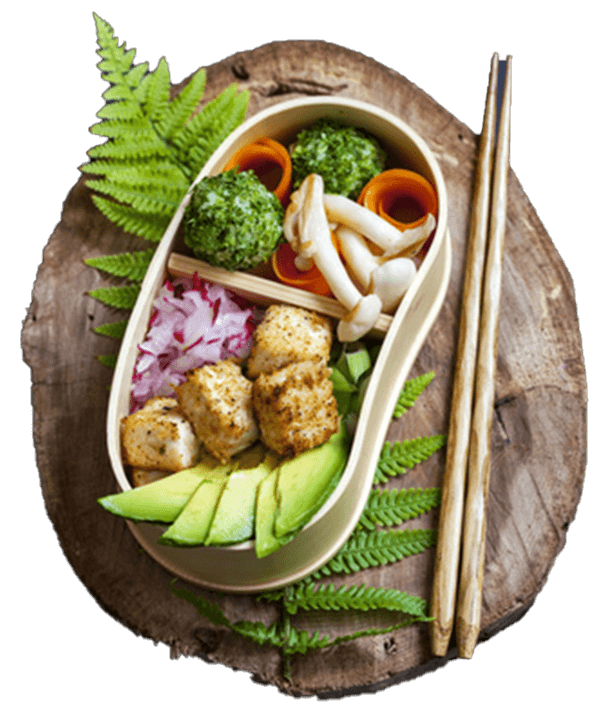Work & life
Increased performance through a healthy diet
Fit at work thanks to a healthy diet
You know how it is – you’ve had a hectic working day with long meetings, or perhaps numerous business trips, constant working in front of your PC monitor – so you haven’t had much time to think consciously about a diet.
Stress in everyday working life and unhealthy eating habits are often reasons for an imbalanced metabolism and consequently for overweight and illness. Conscious nutrition is also a key to success. It increases your performance and gives you long-term energy and vitality.
But what does a good business plan for your health look like –and how can it be efficiently integrated into your hectic daily work routine?

At your best throughout the day - making it work for you
- Start your day with a nutritious breakfast full of energy.
- Avoid short-term “power suppliers” like coffee, energy drinks and chocolate bars. You’ll be better off with wholesome snacks such as fruit, vegetables, nuts and yoghurt. Drink enough water to maintain your concentration.
- During your lunch break, do without sausage and chips at the snack bar. The low performance is pre-programmed with high-fat meals. Choose dishes that will sustainably supply you with nutrients and fibre.
- Wholemeal breads with cheese, raw vegetables and fruit are ideal for your business trip. They can be prepared without effort and packed safely for transport.
- Consume your food conscientiously and not during the hustle and bustle of working at your desk.
- Even if stress cannot always be avoided, be careful with yourself and listen to your body. Frequent lack of power, irritability, sleep disorders, nervousness and physical complaints such as dizziness, circulatory disorders, stomach problems and back pain are warning signals for a prolonged overstrain caused by stress.
- Possible ways to achieve more tranquillity and balance can be walking, reading and sports. However, relaxation techniques such as autogenic training or progressive muscle relaxation also help to reduce inner restlessness, tension and anxiety.
- Take a breather in the office at the open window, for example, or take a walk during your lunch break. Get some exercise with short stretching exercises at your workplace, or climb the stairs instead of using the lift.
Well supplied – even on the road
Business travellers and commuters regularly spend hours in a car or train. Eating a healthy diet is a real challenge when you’re faced by travel stress like this. The solution? Lunch boxes in which you can take complete meals with you.
You often don’t have enough time for a relaxed meal, and what’s on offer en route can be overpriced – and unbalanced. So we quickly slip back into old behaviour patterns, eat hectically without thinking about it and fall back on fatty fast food. Her is a much nicer alternative – provide yourself with fresh and balanced food on your travels! This is really enjoyable, packed in aesthetically-designed boxes.
For example, the Bento box has a long tradition in Japan. 1,000 years ago, bamboo tubes served as lunchboxes for warriors, field workers and fishermen. To this day, these practical and elegant Bento boxes allow schoolchildren and business people to enjoy full meals away from home.

Aesthetically-designed and superbly practical – the Japanese lunchbox
- In the Bento box, you can store different types of food next to each other with the help of removable partitions and inner containers, enabling you to put your meal together individually.
- There are no limits to creativity – and
- there is also space for cutlery at the edge of the box.
- Bento boxes are available in many different designs.

Emergency! How to recognise stress.
When you are in a negative stress situation, everything goes over your head and a solution is not in sight. In the long run, excessive demands like this can make you really ill. What happens in the body? And what are the typical warning signals?
Feeling overwhelmed, over-active, restless, hectic or threatened – in the case of chronic stress, your organism is on constant alert. An exhausting and – in the long run – also health-endangering condition.
It is now a known fact that stress can make people ill. If we are constantly under stress, many body systems run at full speed (e.g. your cardiovascular, hormone and nervous systems), while others slow down one by one (intestinal activity). This is triggered by the many stress hormones that reach the organs via the bloodstream.

Typical illnesses associated with stress
Stressed people often suffer from:
- gastrointestinal diseases
- cardiovascular diseases (arterio-sclerosis, heart attacks, high blood pressure)
- headaches and back pain (tension)
- elevated blood sugar or cholesterol levels
- depression and anxiety
- and they generally have a weakened immune system, which increases susceptibility to infections and cancer.
It is really important to perceive stress symptoms as warning signals.

Possible signs of stress
Mentally:
- Negative thoughts like, “This is all going to go wrong anyway.”
- Or, “I can’t do this”
- Constant comparison with others
- Poor concentration
- Forgetfulness
- ‘Blinker’ effect
- Feeling of emptiness in the head
Physically:
- Frequent tiredness, weakness, feeling faint
- Inability to switch off, feeling less and less rejuvenated
- Insomnia
- Dizziness, circulatory problems, increased blood pressure
- Stomach and/or intestinal problems, seemingly with no organic cause
- Back and/or heart pain
- Sexual dysfunction
Socially:
- Withdrawal up to self-isolation
- No more time for yourself
- Neglect of sports, friends, family, holidays
- High level of coffee consumption
- Regular alcohol consumption
- Increased smoking
Emotionally:
- Frequent irritability, bad temper
- Nervousness
- Anxiety
- General cooling of the (compassionate) feeling to the point of insensitivity
- Aggression and anger
- Depression
It can be helpful to differentiate between stress characteristics depending on their levels. Different symptoms often appear at the same time, especially in the case of the burnout syndrome. The signs should not be ignored – burnout can lead to weeks and months of an inability to work, so it’s better to react to the signals in good time. What exactly can you do to successfully cope with stress?
Targeted stress management – it helps
Unhealthy stress starts in the head. How do you contribute to this – and what helps? With targeted relaxation methods you can bring balance and satisfaction back into your life.
Keeping stress out of your life isn’t the answer. There are also positive stress occasions where you respond – appropriately – to threats and performance requirements. The difference is, after experiencing positive stress, you’ll always come down to a calm level again. Just how high your level of negative stress actually is depends greatly on how you assess the situation and your strategies for coping with it. Stress is the result of your mental evaluation.
Once you become aware of how much you contribute to your stress situation, you can actively influence it and make positive changes.
Even short breaks can have a relaxing effect, e.g. walking, making music, dozing, reading and (endurance) sports. The only important thing is that you don’t see the hobby as a “task” to be done as well. We tend to turn everything else into a stress factor in everyday life, especially when we’re running in overstrain mode. This is why targeted relaxation procedures come so highly recommended.

Our tips – relaxation methods for everyday life
Relaxation exercises have a targeted effect and are easy to use. They help to reduce inner restlessness, tension and fears and to bring about conscious relaxation, step-by-step.
Mindfulness exercises: You are mindful when you are aware of all the things in and around you that have no real value for you. This increases your ability to consciously differentiate yourself from requirements, e.g. to politely say “no” or to postpone a task until later. Mindfulness leads to more self-determination in life and consequently to less stress and feelings of powerlessness.
One recognised method, for example, is mindfulness-based stress reduction (MBSR), developed by the American molecular biologist Jon Kabat–Zinn. It is based on Buddhist roots, but is also detached from religious faiths. For example, you concentrate on breathing and on individual muscle movements associated with it, such as lifting and lowering the abdominal wall. Meditation also helps you to become more attentive in everyday life.
Autogenous training – during autogenic training, you relax your psyche first (“autogenic”) and consequently your body automatically. A group leader, a CD recording or you yourself in thoughts say formulas and sentences that suggest certain feelings. For instance – “My right arm is heavy” or “My right arm is pleasantly warm”. In this way, you go step-by-step through your whole body. With regular practice, the suggestions reach your unconscious, are converted into nerve impulses of the vegetative nervous system and influence body functions such as heartbeat, respiration, stomach-intestine activity, the blood circulation of muscles & skin and heat balance.
Progressive muscle relaxation – with this method you first relax the body and then the psyche. You go step-by-step through your body and tighten specific muscle parts, hold the tension for a few seconds, let go when you exhale and then let the relaxation take effect for up to 60 seconds.
There are, of course, many other relaxation procedures such as
- breathing therapy
- biofeedback
- Feldenkrais
- yoga and
- qigong
Tips – find out what suits you best – and then incorporate a daily exercise into your everyday life.
Eat delicious and healthy food – even in the office
Fast food in front of your monitor – during your hectic working day, healthy meals and healthy eating habits are often neglected. What are the alternatives? Fortunately, there are some available to you! Here are some suggestions and ideas.
Who hasn’t done this at some time? You read the newspaper during breakfast, eat a quick snack while walking or hastily devour lunch in front of your monitor – sometimes there is simply no time for a consciously healthy meal in your everyday life.
In the long run, however, such habits can be harmful. Scientists have shown that diet, exercise and stress behaviour influence each other. How we eat and what we eat therefore has a massive effect on the stressful life of our body – this is why we should get used to healthy nutrition rituals.
Under stress – more vital and mineral substances for the body
When we have to act quickly, we often eat foods that are rich in sugar and fat, like fast foods, sandwiches and ready-made meals – and this is bad, because the stress means that our bodies have an increased need for vital substances such as vitamins and minerals – and this need remains unsatisfied by unhealthy eating behaviour. That’s why it’s important to supply the body with healthy, vital and mineral-rich foods, especially at work.

Tips for your day-to-day work:
- Eat enough poly-unsaturated fatty acids. Omega-3 fatty acids are found in rapeseed, walnut, hemp and linseed oil, for example, and also in fatty fish like mackerel, salmon and tuna. Omega-6 fatty acids are found abundantly in vegetable oils such as soya, maize germ, wheat germ and safflower oils.
- A sufficient supply of vitamins B, C and E is also very important. The main vitamin B suppliers include legumes, animal products and cereals. A meal of tasty chicken and lamb’s lettuce as a side dish, for example, would be ideal. Vitamin C is found in fruits such as oranges, strawberries and kiwis, but also in vegetables such as broccoli and paprika. For example, Vitamin E is found in hazelnuts, currants and oils like rapeseed oil and sunflower oil.
- Alkaline foods maintain the acid-alkaline balance of your body. If it is over-acidified, we feel tired, defeated and have difficulty concentrating. Acidifiers are e.g. meat, coffee and fast food. Try taking several portions of fruit and vegetables every day. For example, make it a habit to eat a salad with sprouts, shoots and herbs at lunchtime. In contrast to rice and noodles, potatoes are alkali-forming and will satisfy your hunger.
- Avoid a hectic lunch in front of your monitor, instead, plan enough time for your meals. It’s worth it, because you will work more effectively if you have the time to relax and enjoy.
You’ll quickly notice what a difference healthy nutrition makes in everyday working life – just try it out!

How to stay efficient and healthy
Quality of life and performance are closely related. When everyday demands rob us of so much energy that enjoyable activities are no longer fun, that’s a sign that we urgently need to change something. But how can we succeed in this?
When it comes to optimising performance, many of us believe we have to function even faster and more effectively. We at Metabolic Balance have a different definition of efficiency: for us, it means using your own energy balance in a healthy way for the daily tasks you have to perform. If, on the other hand, you put yourself under pressure and ignore your needs, this will only lead to negative stress, excessive demands and, in the worst scenario, to burnout. Healthy performance can be achieved above all through pleasant and enjoyable things, like recreation, exercise and a healthy diet.

Tips for more energy in your everyday life
Create peace islands for yourself: Sometimes just five minutes of consciously letting go is enough to regain your balance during the hectic daily routine. Build these oases firmly into your everyday structure, e.g. as meditation, journeys of thought, as a short nap or a walk in nature. If you have an hour or more to spare, you can use specific methods to cope with stress, such as progressive muscle relaxation or autogenic training.
Move around in the fresh air – the combination of movement and oxygen will recharge your empty batteries. Light endurance sports are ideal. A daily walk in the fresh air also balances work and psychological stress. Do you notice how your mood brightens? The more regularly you move outdoors, the less drained you will feel.
Tip: Enjoy a walk in the morning and start the day in a good mood!
Eat a healthy diet – the right diet is the basis for health and performance, because it directly affects our brain and our ability to think and concentrate. Being moderate in all you do can really promote mental fitness.
For example, in the Okinawa region of Japan, there are relatively more centenarians than anywhere else in the world. In addition to their healthy diet, they have a golden rule: “Only eat until your stomach is 80 percent full!” The conclusion? Those who eat consciously and don’t always go over the top will be rewarded with more vitality and performance into old age.
Do you want to eat healthy food in everyday life in order to maintain your mental and physical fitness? Try these recipes – they are based on natural ingredients and a balanced nutritional philosophy.
Your personal path to a work-life balance
Leading a life in balance ensures satisfaction both at work and in your private life. And getting it to work isn’t difficult at all! We will support you with tips and practical exercises – give it a try!
We are more than our work. Nevertheless, our job gives us a lot. Some realise their talents and visions through their profession and many draw self-esteem from their work – and of course the job secures our existence, because it brings us the money we need to live.
However, making work the 100 % focus of your life can lead you into the stress and burnout trap. A healthy balance between work and private life is a fine art – even if your employer doesn’t offer advantages like flexible working hours, child care and health courses.

How can this work?
Take your work-life balance into your own hands in small steps
- Check your career goals: What motivates you and what are your goals? Do you want more professional success, social recognition, maybe a higher income? Or more independence and satisfaction? If you answer these questions honestly, you can then set the right priorities.
- Take a close look at your current activity: Is your job still the right one? Was it never the right job, or have the circumstances changed? Do you enjoy your work? Satisfying your own needs doesn’t have to take place exclusively in your private life. If possible, try to learn like your work! To drag yourself into the office every morning with negative feelings will create sheer stress for you in the long run. Is there perhaps a training opportunity for you or a job that would suit you better?
- Take a break for a minute and pay tribute to your own achievements: Have you completed a task and reached a milestone for today? Then it’s time – and important – to recognise and appreciate your own performance. Sit back and take a deep breath. Think again about the activity you just finished – and then say goodbye to it with a long exhalation. Now you can turn your attention to the next task.
- Don’t stay late in your office or factory on normal working days: Nothing provides more balance than spending the evening with your family or friends or devoting yourself to other things that you enjoy.
- Take good care of yourself at work too: A small break at an open window works wonders! And a short walk is great at lunchtime. Stretching exercises are ideal for forgetting your workplace from time to time – and they even work well when you’re sitting down.
- Enjoy your lunch – best of all without stress and hustle & bustle. For example, avoid eating fast at your desk in front of your monitor
- Stay calm! Stress and overload situations are part of everyday working life, but you can make it much better by saying to yourself, “When this is finished, I’m going to get my balance back!” It’s very important that you implement this plan promptly as soon as the stress situation no longer exists.
Practical exercises for more balance
Work-life balance is achieved with small steps and healthy rituals. Physical exercises are a great way to bring your system back into balance – even in the midst of everyday life. Here are our exercises for inner and outer balance.
Your inner balance will be more easily restored if you show an externally-balanced, erect body to the world. Even the simplest exercises can achieve a better sense of balance. And the best about this? These exercises work without tools and almost anywhere.

Light one-leg stand
The perfect exercise for the bus stop! Use the waiting time for a short workout. Repeat the exercise as often as desired.
- Stand up straight and fix your eyes on a point a few yards away. Both feet are hip-width apart and have solid contact to the ground.
- Shift the weight to the right leg and tighten the muscles in your buttocks and thighs just a little.
- Raise your left leg slightly. Hold this position for a while.
One- leg stand for the advanced among you
This exercise makes you flexible and relaxed, and promotes a good posture and concentration. The best time to practice is in the morning and/or evening.
- Stand up straight.
- Place the toes and ball of your left foot on the instep of your right foot. The heel of the left foot points upwards. Do not support the heel on the shinbone.
- Bring your fingertips together in front of your chest or place your hands on each other as if in prayer.
- Now slowly stretch your arms upwards in front of your face. First place your wrists on your head and then move your arms into the vertical position. Pull them up as high as you can without getting any tweaks of pain.
- Try to maintain your balance in this position for about one minute. Breathe in and out deeply and calmly through your nose.
- When you feel safe, close your eyes briefly.
- Now repeat this exercise with the other leg. Do it three times with each leg. In between repeats, loosen your leg muscles and relax.
Purpose instead of burnout – how does that work?
Stress, too much work or too little: many people find their work unsatisfactory. Of course, there’s no such thing as the perfect job – but when we feel increasingly burnt out and burdened under our heavy load, it’s time for the crucial question: “Are we (still) in the right vocation?”
Maybe this sounds familiar ... We do something that fulfils us inside. We are motivated because we’re doing something valuable. We’re good at it, and it gives us pleasure. And the amazing thing is, we don’t feel any undue effort doing it. On the contrary, we develop the strongest inner strengths, creativity and commitment. That’s a calling, a vocation. On the other hand, we feel completely different if we don’t want to do a particular task at all.
Even if we drive ourselves with sentences like “Pull yourself together” or “Everybody’s got to go through this”, in the end we feel exhausted and empty.

Being able to express talents
As thinking and feeling people we want to develop and be creative. Ideally, we can use our personality with all our talents and abilities in our profession. However, for many of us, this is simply unattainable. This can also be accompanied by limitations in other areas of life. For example, those who decide to work freelance to fulfil themselves job-wise may have to put up with financial uncertainties. Anyone who decides on a dream job abroad must leave their familiar surroundings behind.

What makes you feel good?
The good news is, you don’t have to turn your life upside down to get the feeling that you have a “vocation”.
- A meaningful task does not always have to be something big, something that changes the world. Many people draw great satisfaction from inspiring recreational activities. When we pander to our creative sides – whether at work or practising a hobby – we recharge our batteries.
- Sometimes it’s enough for us to develop our talent in one part of our job – but maybe there’s an opportunity to expand this area of responsibility? At your workplace, how could you develop in a direction where your talents are needed more? Is there any further education or training that could help you?
- Breaks and time-outs promote creativity. It’s no wonder that good ideas often come about on walks or in the shower and not at the workplace, because powering through the day leads to tunnel vision and control constraints. Take a deep breath several times a day to get rid of it. For example, our exercises for more balance will help you to ground yourself.
- Integrate sensuousness into your everyday life. For example, healthy, lovingly-prepared meals can work wonders. What tastes good to you? What actually does you good? What culinary delights are waiting for you to discover them?

